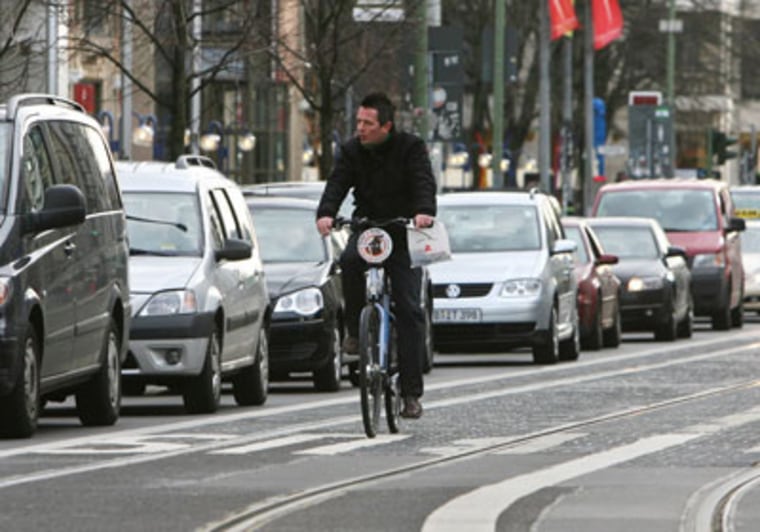You can arm yourself with an iPod full of movies, install fine leather seats and satellite radio, and convince yourself some poor sap has a commute worse than yours.
Except that isn't likely to improve it.
Chances are, those traveling to work in Hong Kong, Berlin and Osaka, Japan, don't need to adopt such tactics. That's because their commutes are among the world's most reliable, cheap and efficient.
The dense cluster of jobs on Hong Kong Island makes it possible for 90 percent of residents to commute on public transit. Osaka's high-speed rail connects it to the suburbs of Kobe and Kyoto, and Berliners, who rely heavily on bicycles, have few traffic problems compared with residents of cities like New York or Rome.
Dakar, Senegal, London and Chennai, India, also make the list.
Ease of urban mobility
We compiled our rankings using data and research supplied by Jeffrey Kenworthy, a transportation professor at Murdoch University in Perth, Australia. He measured the world's 84 largest cities on the following criteria: the cost to the consumer and the government, overall investment in improvements, and the speed and safety with which workers are delivered to offices.
Scores were adjusted for gross domestic product, which allowed developing cities like Dakar or Krakow, Poland, to compete with cities from highly developed G8 nations.
Dense cities perform particularly well by our measures. There are only 8,000 full-time residents in the City of London, but there are 320,000 jobs there, according to the City of London Economic Development Office. That sort of commercial density makes the London rail system a very efficient mechanism for delivering people to their offices. The Tube, which is the world's largest urban railway, and commuter trains efficiently move people in and out of the city, whereas cars in such a small space would overwhelm the system.
The speed of transit not only benefits commuters; it contributes to a city's economic competitiveness. Outsourcing capitals like Chennai, which are heavily reliant on attracting informational technology companies, do well on our list due to the city's high investment rate in projects like the IT highway, and its MSRT mass transit rail system.
"Ease of urban mobility is a prerequisite for business to reach supplies and customers," says Maria Krautzberger, permanent secretary of the Berlin Senate Department for Urban Development. "Cities cannot secure their position in global networks otherwise."
Infrastructure improvements
The problem, however, is paying for those sorts of infrastructure improvements.
"When you add to taxation in order to pay for improvements, it makes the citizenry less competitive, compared to another city because of the tax burden," says Francine Senecal, vice chair of the City of Montreal's Executive Committee. At the Metropolis Conference in Sydney, Australia, last week, a meeting of private and public funding bodies, she pointed to the need for public/private partnerships in infrastructure development, a joint investment in roads, or works projects.
"Public-private partnerships allows the public sector more maneuverability because they don't have to increase the tax burden," she says. "Though obviously regulation is very important."
Seoul, South Korea, for example, relies on a $2.5 billion Macquarie investment fund to spend on transportation and infrastructure improvements, while cities in India have sought market funding in the form of investment-grade municipal bonds for $302 billion in improvements over the next five years.
Of course, each city's traits come into play. Berlin's compact nature and commitment to bicycle lanes have made riding to work a popular option. According to the city government, 13 percent of all traffic is bicycle traffic, which keeps transit costs low for residents on the whole, and alleviates road traffic for drivers because there are fewer cars on the road.
And in Houston, jobs and population are so spread out that a relatively complex train system is needed. The city government has proposed between $3 billion and $7.5 billion of light rail improvements since 2003, though little has been done to successfully alleviate mounting traffic, which consistently ranks the city towards the bottom of our U.S. commute lists.
In the end, though, a poor commute is "a relative concept," says Nathan Rees, premier of New South Wales, Australia. "It's like being in love. If you think you are love, you are in love. If you think you are in traffic, you are in traffic."
